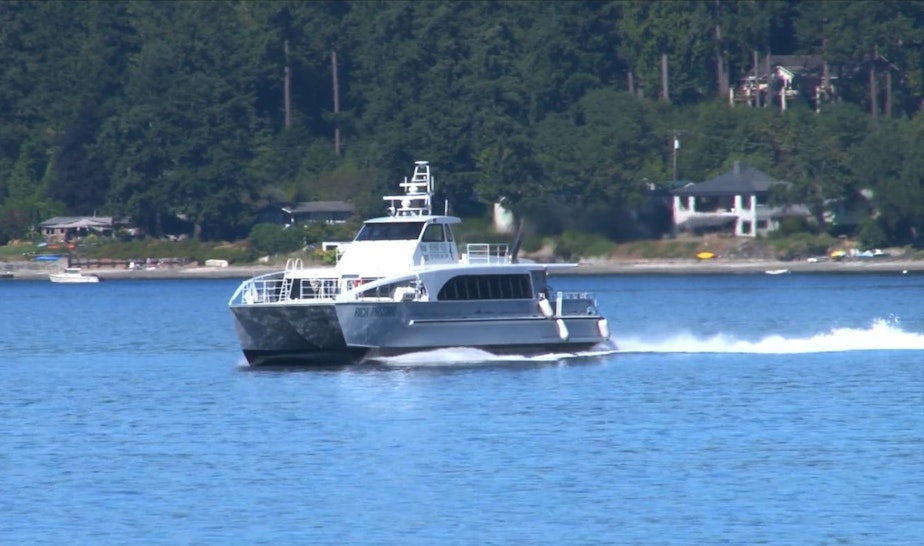Will high-speed ferries cross Puget Sound again? Kitsap voters to decide

A Seattle-area transit initiative takes in money from real-estate interests who could profit if the initiative passes. Commuters would face higher taxes, but many could also get to work faster.
No, we’re not talking about the $54 billion proposal to expand Sound Transit service (that campaign has been largely funded by $1.1 million from the construction industry, with the real-estate sector coming in second.)
Across the water, a much smaller initiative is up for a vote this fall: Kitsap Transit’s proposal to run six fast, passenger-only ferries between downtown Seattle and Bremerton, Kingston and Southworth on the western shores of Puget Sound.
The Friends of Fast Ferries campaign has gotten a late start, only taking in its first major contributions in the past week, according to reports filed with the Washington Public Disclosure Commission on Friday.
Every week, campaigns in Washington are required to tell the public who gave them money that week. And every week, KUOW is going to use data from the PDC to see what they’re reporting.
Sponsored
“We’re putting signs out here this week,” Jeremy Stitt with Friends of Fast Ferries said. “We’re actively fundraising right now.”
Stitt also works at Sound West Holdings, a Bremerton real-estate developer that gave the campaign the largest of its three contribution to date: $5,000. The Bellevue-based owner of the Harborside Commons parking garage, a block away from the current ferry terminal in downtown Bremerton, gave $2,500; Stitt gave $105.
The ferry proposal would cost $48 million up front to buy boats and improve passenger terminals. Operating expenses of at least $12 million a year would be paid mostly by taxpayers, not ferry riders: each passenger’s ride would receive a subsidy of at least $17 (on top of one-way fares of $5.25 to $6). Passage of the ballot initiative would raise the sales tax in Kitsap County by three-tenths of 1 percent.
Stitt said he is not aware of any opposition to the proposal, and none has been disclosed to the PDC.
Bremerton had a fast-ferry service until 2003, when complaints about erosion of the Bainbridge Island shoreline along Rich Passage from the boats’ wakes caused service to be canceled. Kitsap voters rejected efforts to revive the service in 2003 and 2007.
Sponsored
According to Kitsap Transit, recent testing of a new 118-passenger ferry, called Rich Passage I, shows fast ferries can cross the sound at high speeds without harming any shorelines. A trip from Bremerton to Seattle that takes 60 minutes on a car ferry today could take just 28 minutes if the initiative passes.
Other revelations from this week’s Washington Public Disclosure Commission filings:
- House Democrats are spending big to hold on to their majority in Olympia. Last week alone, they kicked in $130,000 to four Democratic challengers: $40,000 to Shelley Kloba (1st-Kirkland); $40,000 to Teresa Purcell (19th-Longview); $30,000 to Katrina Ondracek (44th-Everett); and $20,000 to Michelle Chatterton (25th-Puyallup). Two of those four candidates (Ondracek and Chatterton) represent opportunities for Democrats to take seats currently held by Republicans; the other two are running to win seats Democrats are defending.
- Senate Republicans passed “Go” and collected quite a bit more than $200 from landlords, homebuilders and a railroad (so far, Monopoly fans, no word from the thimble or Community Chest). The Washington Multi-Family Housing Association, representing property managers and owners of multi-unit buildings, gave $40,000 to a committee representing the Washington Senate Republicans called the Leadership Council. The council reported raising another $10,000 from BNSF railway; $10,000 from Associated General Contractors; and $50,000 from four other corporate backers.

